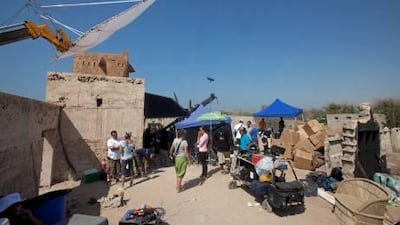RAS AL KHAIMAH // The stuntman stands on top of a fort in an abandoned village and waits for one of America's most famous horror film directors to give the order.
A hush falls over the film set as Tobe Hooper points to the man and orders the cameras to roll.
Moments later, a figure leaps from the building, falls 10 metres and lands headfirst on a pile of cardboard boxes.
It was day three of filming on the set of Djinn, the first Arabian horror film to come from Imagenation, the film production arm of Abu Dhabi Media, which owns The National.
Hooper, the director behind The Texas Chain Saw Massacre and Poltergeist, came on board with Imagenation last month, saying that horror films had an international language that transcended all cultures and borders.
"Tobe was definitely top of our list when we sent out the script to Hollywood because he has set trends in the horror genre," said Daniela Tully, the film's German producer. "He kick-started a new trend where most of the gore takes place in your head without actually showing it."
The stuntman who took a dive from the fort in Al Jazira Al Hamra was portraying Bobby, an American backpacker who travels to the UAE and is introduced to the idea of the supernatural spirits, known as djinn, by two young Emiratis. A flashback scene at the beginning of the film shows that Bobby is sceptical about the existence of the spirits. Then he becomes possessed by one. His bloody end marks one of the only gory scenes in the film, said Ms Tully.
"There is not that much blood," she said. "It is more of a supernatural horror rather than a thriller or slasher horror. It is a tale told with a lot of respect for the Emirati traditions and it will stay with you for a long time."
The film is set in 2015 and follows the story of Khaled and Salama, a couple who return home from America to discover their apartment in a luxury high-rise, built on the site of the deserted fishing village, is also home to malevolent beings.
"There is a moral to the story as well," said Ms Tully. "We want to show the beauty of the old sites of heritage in the UAE and send out a message of preservation."
The half-English, half-Arabic film was the first of its kind, said Ms Tully. The filmmaker and UAE diplomat Mohammed al Otaiba is serving as consultant on the film, answering questions and explaining any cultural sensitivities.
Mr al Otaiba, who has worked for the past 10 years for the Ministry of Foreign Affairs, said so far the experience had been fascinating.
"I have really learnt to pay attention to every detail," he said. "The most important things I focus on are language, dialect, expressions and costume. Of course, then there is the aspect of the djinn."
There is a strict rule: no one can mention the word djinn while on set. The measure has been taken out of respect and because it is thought that speaking their name could conjure one up.
"The myths and folklore surrounding the djinn are entrenched in local culture," said Mr al Otaiba. "Belief in their presence depends on your level of faith."
Paul Luebke, the 25-year-old British actor who plays Bobby, has remained as sceptical as his character.
"I wasn't a believer when I came and I'm not really one now," he said.
He is hopeful that working alongside Hooper and the rest of the Imagenation crew will prove a career boost.
"When I was a kid I watched the The Texas Chainsaw Massacre and I was scared to death. So to be here now and working with such a master of his art is amazing. It's really inspirational."
Having completed outdoor shooting, the 70 members of the film's cast and crew move to a purpose-built indoor studio in Dubai today.
Filming will be completed by the end of April, when post-production will start. Ms Tully said there were already plans in place to make a prequel and a sequel. A release date has not yet been announced.

